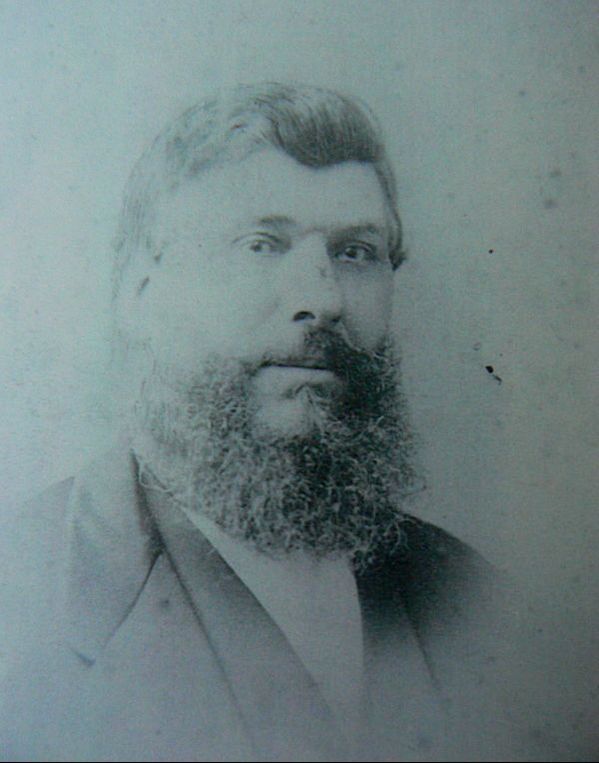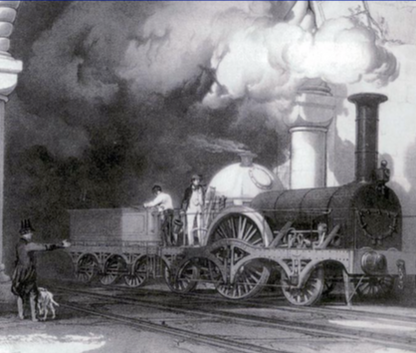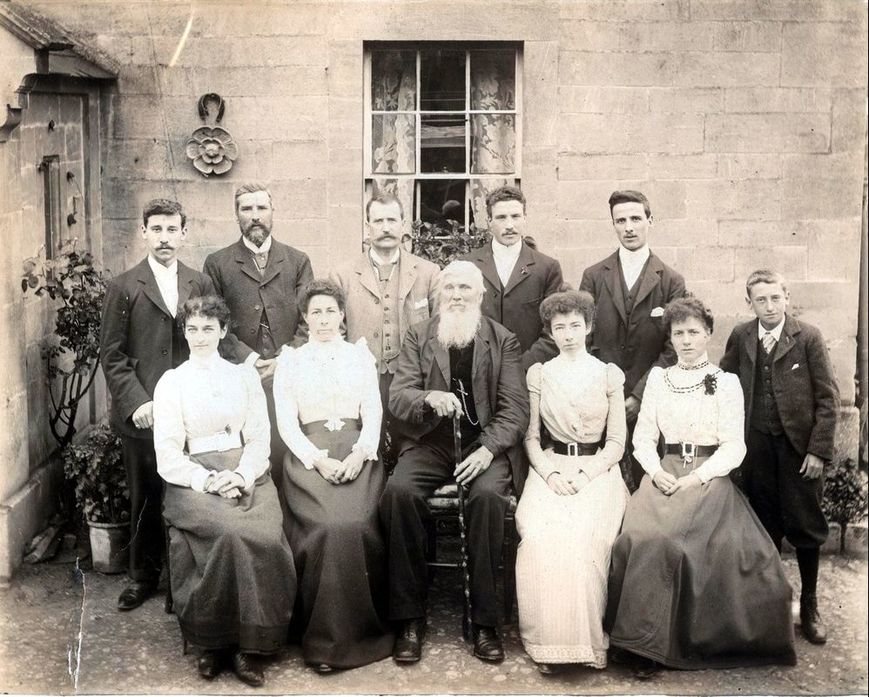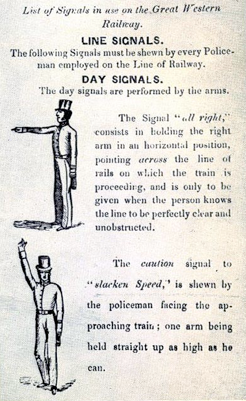|
Mark Cogswell: Railway Policeman Barbara Davey January 2017 My great-great grandfather, Mark Cogswell (1819 - 1905), was a Railway Policeman. He worked for Great Western Railway (GWR), which ran the Bristol & Exeter Railway and the Wiltshire, Somerset & Weymouth Railway. Mark worked on each of these railways. He was based for a time at Wellington near Taunton in Somerset, where two of his sons were born, Frederick in 1846 and William in1848. According to the 1851 census, he was based at Bristol as a Switchman (a rank within the railway police) and was working at Warminster in 1853, where his son Harry was born. Left: One of the few photographs of Mark Cogswell (courtesy Barbara Davey and the Cogswell family |
In many respects the railway companies were one of the first modern employers in Victorian society. They offered their staff training and career promotion and a company-subsidised friendly society providing pensions for retirement or ill-health. In some areas they built churches, schools and insisted on morality and respectability from their staff. The employees were conscious that they were privileged to have reliable employment and status in their community. This was certainly the case with Mark Cogswell who lived in Brookwell, Box Hill and was one of the very first Railway Policemen appointed in the industry.
Career with GWR
By 1861, Mark was based at his home village of Box, where his occupation was Pointsman and Signalman (both of which were part of the railway police). Mark and his wife, Elizabeth, remained in Box for the rest of their lives and had two further children, Mary and Kate. From 1863 they rented Brookwell Cottage from Thomas Henry Allen Poynder of Hartham Park at an annual rate of £10. They remained as tenants at Brookwell until Mark’s death, when their son, William, took over the tenancy.
Mark was working for GWR from the mid-1840s when railway travel was still very new. The line from Bristol Temple Meads to Bath opened in August 1840 and the line from Bristol to St David’s Exeter in May 1844. Mark must have been one of the first Railway Policemen on the Bristol & Exeter Railway.
By 1861, Mark was based at his home village of Box, where his occupation was Pointsman and Signalman (both of which were part of the railway police). Mark and his wife, Elizabeth, remained in Box for the rest of their lives and had two further children, Mary and Kate. From 1863 they rented Brookwell Cottage from Thomas Henry Allen Poynder of Hartham Park at an annual rate of £10. They remained as tenants at Brookwell until Mark’s death, when their son, William, took over the tenancy.
Mark was working for GWR from the mid-1840s when railway travel was still very new. The line from Bristol Temple Meads to Bath opened in August 1840 and the line from Bristol to St David’s Exeter in May 1844. Mark must have been one of the first Railway Policemen on the Bristol & Exeter Railway.
|
Railway Policemen were appointed to preserve law and order during the construction and maintenance of the railways, to protect the line itself and to control the movement of railway traffic. In addition to his uniform (probably a top hat and tail coat), he would have been issued with a watch, flags, a lamp and probably a truncheon bearing the GWR insignia. The watch was to ensure there was a suitable delay between the trains entering each section of track, thus avoiding collisions.
In the early days, Mark would have used the flags to communicate with the engine drivers, red for stop, white for all clear and later would have operated signal switches and stop blocks. His job might have also included using the telegraph and issuing tickets. So Mark would have had a lot of responsibility for ensuring that the railway line ran smoothly and safely on his patch. |
Life in Retirement
I think that Mark retired in 1885 at the age of 65, as this would tie into his Sick Allowance payments. He certainly retired before spring1891 as the census for that year says GWR servant retired on pension.
Although employment records for GWR have brought forth nothing on Mark, the GWR Provident Society did. This Society was a benevolent fund which covered sick pay and pensions for its servants (employees). Extracts from their annual accounts show the following payments to Cogswell M, Brookwell Cottage, Box :
I think that Mark retired in 1885 at the age of 65, as this would tie into his Sick Allowance payments. He certainly retired before spring1891 as the census for that year says GWR servant retired on pension.
Although employment records for GWR have brought forth nothing on Mark, the GWR Provident Society did. This Society was a benevolent fund which covered sick pay and pensions for its servants (employees). Extracts from their annual accounts show the following payments to Cogswell M, Brookwell Cottage, Box :
|
Year ending
1880 1881 1882 1883 1884 1885 1902 1903 |
Annual Amount
£2.3s.9d £12.4s.8d £1.6s.3d £4.4s.7d £5.5s.0d £1.12s.1d £12.15s.0d £6.8s4d |
Later Life
Although the records are not necessarily complete, it would appear that, from the age of sixty, Mark’s health had its ups and downs. However, he had many years in retirement before he died on 27 April 1905 at the grand age of eighty-six, from senile decay and heart failure, having suffered influenza for three weeks before his death.
The Wiltshire Times for Saturday 6 May 1905 carried the following obituary for him:
On Friday the death occurred of Mr Mark Cogswell, an old and much respected resident, at the age of 86. Deceased was formerly in the service of the GWR Company, but had for many years lived in quiet retirement. He was one of the oldest members of the Loyal Northey Lodge of Oddfellows and early in its history was secretary for a considerable period. On his death, the GWR Provident Society paid a Funeral Allowance of £10.
Although the records are not necessarily complete, it would appear that, from the age of sixty, Mark’s health had its ups and downs. However, he had many years in retirement before he died on 27 April 1905 at the grand age of eighty-six, from senile decay and heart failure, having suffered influenza for three weeks before his death.
The Wiltshire Times for Saturday 6 May 1905 carried the following obituary for him:
On Friday the death occurred of Mr Mark Cogswell, an old and much respected resident, at the age of 86. Deceased was formerly in the service of the GWR Company, but had for many years lived in quiet retirement. He was one of the oldest members of the Loyal Northey Lodge of Oddfellows and early in its history was secretary for a considerable period. On his death, the GWR Provident Society paid a Funeral Allowance of £10.
|
Family of Railwaymen
Mark’s brother, James, was also a Railway Policeman. James was born in Box 1815 and died in Frome in 1879. He married Mary Harris in 1840 at which time he was working as a labourer in Box, where they had their first two children. Their third child was born in 1845 in Samford Arundel, very close to Wellington in Somerset, where Mark was based. So James was probably working there as a Railway Policeman at the same time as Mark. However, by 1851 James and Mary were living in Frome, where the census describes him as a Railway Policeman and they were still there in 1871. James was described as a Pointsman when he died in Frome in 1879. The other detail I have about James is that he grew vegetables. The Frome Times of 28 August 1872 reported that he won 1st prize (3s.6d) for his onions and 2nd prize (2s) for his parsnips at the St Mary’s District Cottagers Horticultural Show ! Right: Duties of a railway poiceman in early GWR instructions (courtesy http://www.btphg.org.uk/ ) |
Mark’s son, Frederick, started out working as a gardener in Wellington but by 1871 was an Engine Fitter based in Bristol and by 1881 had moved to the Swindon works. In January 1885, Frederick joined the London & South Western Railway as an Erector, his location being Station: NE. In the 1891 census Frederick and wife Sarah were in West Ham, Essex and he was an engine fitter, presumably still with the L&SW Railway. However in the 1901 census, still in West Ham, his occupation is given as a Ship’s Engineer. Frederick and Sarah moved back to Somerset some time before the 1911 census where at the age of 65, he says he is an engine fitter – unemployed. The boom years of railway mania in the early 1840s was obviously over. I hope that Frederick found something fulfilling to do because he had a very long retirement, eventually dying in Bath in 1941 aged 94.
Frederick’s son, Mark Edward (known as Edward) born in 1869, was apprenticed as a Fitter for GWR in Swindon on 15 March 1883. It should have been a seven-year apprenticeship but he absconded on 25 July 1887 after four and a half years! We have yet to discover why he left or where he went.
Frederick’s son, Mark Edward (known as Edward) born in 1869, was apprenticed as a Fitter for GWR in Swindon on 15 March 1883. It should have been a seven-year apprenticeship but he absconded on 25 July 1887 after four and a half years! We have yet to discover why he left or where he went.
Sources
With thanks to David Colcomb from Devizes who helped me with the GWR Provident Society research.
With thanks to David Colcomb from Devizes who helped me with the GWR Provident Society research.
In many respects Mark Cogswell was a typical railway employee: respectable, a pillar of society and a family man. He was the sort of person that the early railways wanted as an employee and they appointed him to one of the important roles in their staff, a Railway Policeman. But the company ethos wasn’t suitable for all, as the story of Mark’s grandson, Mark Edward, implies. Conformity with the company's strict moral and ethical standards and its grading hierarchy were too restrictive for some people, who wanted to follow a more individual route.



